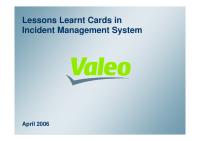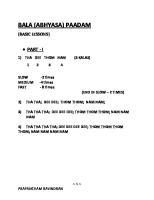Eln Old Realm Lessons [PDF]
Old Realm Lessons Old realm. The language of magic. The tongue of the gods. The signs of the first age of man. A symboli
44 2 1MB
Papiere empfehlen
![Eln Old Realm Lessons [PDF]](https://vdoc.tips/img/200x200/eln-old-realm-lessons.jpg)
- Author / Uploaded
- Brand55
Datei wird geladen, bitte warten...
Zitiervorschau
Old Realm Lessons Old realm. The language of magic. The tongue of the gods. The signs of the first age of man. A symbolic system that wizards need to know in order to summon a demon, but also the one most scavengers had learn from the warnings on the walls of ruins. Those who don't know it guess it too complex to think there was a day when everyone spoke it, and those who do still wonder how it is that any mortal can learn how to talk with a spirit. The truth is that Old Realm is as complex and impressive as the skill of those who write it. The books written in the second age by mortal savants have a clumsy and poor Old Realm, while the ones written by the solar exalted in the first age are rich in meaning and as beautiful as art pieces. Learning it is not so hard; mastering it takes discipline, skill and inspiration.
Lesson one: The true history of Old Realm Several legends are told about the origin of the Old Realm language, some attributing its creation to Bridgit, some to the gods. None of them are true, but few know how the first language really came to be, as the story itself is an insult to the pride of the gods. Old Realm is actually much older than most people think. It is older than magic and even older than the exalted. It is just some years younger than humanity and it was created by the primordials. During the early times of creation, the primordials had a language of their own, unfathomable for anyone but them; the animals did not need a language; the gods could easily pass their thoughts to each other without the need for words and the dragon kings as well as the mountain folk that existed before humanity developed charms that allowed them to share their ideas with one another trough the use of essence. But when humanity appeared on creation the need for words became obvious. The first humans could not understand the orders of the dragon kings, and while their devotion was high, they had no way of praying to the gods or to the primordials. Worst of all, they seemed unable to recognize the wonders of the world they lived in. Auchthon shrugged and claimed to have made them just as the
other primordials wanted them. So they turned to stare at Aleph, who had first suggested creating humankind. And he sent his fetish soul, Tav the watcher, to fix the humans, and he stood in front of them, pointed at the sun above and screamed the noise that would became the first word. Then he pointed at the life on creation and the second word came to be. For ten years he wandered with the humans behind, pointing and screaming until they learned to recognize the world and make words of their own. When humans returned to the dragon kings they were now full creatures, capable of communicating, of recognizing the world and of praying to the higher beings. And the gift of Aleph was such that for the first time ever the gods felt resentment towards the primordials for not giving them the gift. However, the humans offered it to the gods, temporary calming them. For years this was enough, until one day an insignificant man was born deaf and mute, so he could not use the gift of humankind and could not serve the dragon kings nor praise the primordials. He tried to ask the gods for help, but they ignored him, for he had not the gift that made humans valuable. Crying he drew an image of Aleph on the ground and the primordial once again felt pity. So he sent Zahir, his second soul, and she drew an image of the sun on the dirt like he had done, and on his mind he knew humanity had just received a second great gift. He taught the other humans to write, and they taught the dragon kings. And once again the gods felt jealous and angry, even after humankind offered them this new gift. Back then all humans were born with both gifts, and they all could talk and write in Old Realm. But after the gods and the exalts defeated Aleph, slew his souls and forced him into Malfeas, they made him take the gift away from humankind, so they would need to ask the exalts to teach them the language. Since then Old Realm became the tongue of the wise. Yet humankind knew how to make gifts of their own and those unfortunate who could not learn Old Realm made their own languages, diminished and lower version of the gift that was once theirs.
Lesson two: Meaningful talk In Old Realm all syllables have a meaning and all words are formed by the combination of the meanings of its syllables. For example, the word blood is formed by the syllable lo, that means heart and the syllable xu, which means water. This way, once someone know all the syllables and its meanings, knowing the meaning of a word or creating a new one is just a matter of interpretation. While loxu is the most commonly used word for blood, it is also possible to say blood by saying 'red flow of life’, or 'that which comes out of a wounded body’. Each syllable has a glyph, a small representation of its meaning. Again, while there is a set of glyphs commonly known and considered a standard, any glyph that represents a heart can be used for the ‘lo’ syllable.
This way, knowing Old Realm needs different degrees of knowledge. During the first age, most mortals agreed with a standard set of glyphs and words, while the exalts and the wise played with syllables and glyphs to produce words in the same way a writer plays with words to convey the same idea in different ways, or a painter represents the same image with different shapes. This meant the exalted could understand the common folk perfectly, while they sometimes saw the Old Realm of the wise as obscure and confusing. During the second age most savants who know Old Realm, both mortal and exalted, know the simpler version of the common folk. Understanding the more complex uses of it require a good knowledge of the ways of the first age (therefore needing lore as well as linguistics in order to truly understand Old Realm).
Lesson three: The common Old Realm Syllabary: The vowels have glyphs for when they're used without a consonant. Aside from the syllables, each celestial incarna has a glyph and a sound of their own: Unconquered Sun
Luna
sol
luna
The maidens
Gaia
gaia ellas
Auchthon
auchthon
Each vowel has two glyphs; one used when the vowel is at the beginning of a word, and the second one when it is in the middle. A
E
I
O
U
Strength
Energy
Life
Movement
Union
Flow
Join
Beginning Glyph
Middle Glyph
Force
Chi
Alive
And each syllable has one: A
E
I
O
U
B
Compassion Willpower Valor
Temperance
Light
Darkness
Conviction
SH
Good (yes)
Unknown Wrong (no)
D
Death
Corpse
Shadowland
Underworld Tomb
F
Blade
Stone
Arrow
Shield
Armor
G
Number
Language Name
Say
Write
Blue
White
H
Black
Red
Yellow
K
Human
Thing
Animal
Plant
Behemoth
L
Soul
Hand
Eye
Heart
Parent
Child
Brother
Wyld
Malfeas
Future
Never
Destruction
Creation
Balance
Spell
Charm
Caste mark
Spirit (Little god)
Dragon
Head M
First (primordial)
Spouse
N
Void The world (creation)
Yu-Shan
P
Past
Present
Chaos
Order
Anima
Mote
Always (forever)
R
S
T
Ghost
Elemental
God (Celestine)
X
Wind Fire
Earth
Wood
Water
Y Bind Magic
Ritual
Sacrifice Demon
W
Long
Wide
Prince
Lord
Weight
Time
Space
Noble
Slave
Z
King
TZ
East
South
Center (Blessed island) North
West
Lesson four: phonetic method: This method is the one most savants use in the second age, as it is easier to learn and understand, and allows them to read many of the lesser tomes of lore from the first age. This is the method you want to use in order to put an English (or any other language) word in Old Realm glyphs. It follows the same phonetic rules than the imperial script presented in the player's guide. It is read from top to bottom and from left to right. In each word you must read first the topmost right glyph. Then, if there's one or more glyphs under it, those must be read next, right to left. Once there are no more glyphs under, you continue with the next column. For example, to write EXALTED, you'll need to write EX-A-LA-TE-DE, like this:
Check the order in which the glyphs are set:
Now lets write daiklave: da-i-ka-la-ve:
Or a name, like Ariana: a-ri-a-na:
Lesson five: Meaning method: This is the method used to create the words of the first age. With it, and using your imagination, you can come up not only with the glyphs for words, but also with the way they sound in Old Realm. Lets start with something easy, like dragon king:
The word in Old Realm for dragon king, then, is tozi.
Now lets write demon king:
yozi
As stated before, the word for blood is:
loxu
so in order to write dragon blooded you'll write:
tloxu (remember that cording to the imperial script rules, when you have two adjacent consonants with the same vowel, one of them loses it, therefore toloxu is read tloxu)
and jade could be dragon blooded stone:
tloxufi
Now, if you don't like the way a word sound, or the way it looks, you can write it differently. For example blood could be written using 'red flow of life' instead of 'heart water', and it would be written as:
heoi
Thinking of new words is just a matter of seeing what combinations makes you think of the word you're looking for. Harmony, for example, could be seen as the mixture of order and balance:
rure
So Harmonious Jade would had been known as:
rure tloxufi
Finally, lets see some names. First one made phonetically, so lets pick a long name, like Michael Dracon:
Then one made with the meaning system, like sunshine blind. Sun + light + anima + no + eyes
solssha sholi
And one done mixing the two systems. First Oni using the glyphs for first, and doing oni phonetically:
ma oni
Bonus lesson: The fallen Aleph Aleph, whe who keeps silent.
Aleph does not have a shape. But sometimes in Malfeas the cacophony of demons stops, the Silent One stands and the emptiness of meaning fills the souls of the demons, sending most of the lesser ones into suicide frenzy. Any mortal who witness the silence that is Aleph simply forget the meaning of their own soul and become an empty shell. Even the exalted sometimes fall to the maddening silence of Aleph, losing the gift of word and often loosing precious memories along with it. If an exalted is present when Aleph manifests, she must roll conviction against a difficulty of 2. If she fails the roll she loses a dot in linguistics that can be obtain again only with the expenditure of experience points. If the character has no more dots to lose, she becomes mute, and only magic could cure this condition. A botch on this roll means the character is also deaf. Once, Aleph defined the very concept of definition, and he made possible the communication. Back then he felt responsible for the creation of humankind, and felt pity, for he saw them as creatures unfitted to the harshness of creation. Now he's blind with anger towards the gods, and wishes to relief the humans from the pain of existence. He only has two souls, which made him an easy opponent to defeat in the war against the exalted. Babel, Lord of the unnamed. Third circle demon.
Before the primordial war Babel did not exist. Tav was Aleph's fetish soul. When Tav was destroyed he became two different beings: a broken image of himself, and Babel, who became Aleph's new fetish soul. Babel eats down the name of those who have lost it, and his are the names of all those who have fallen into the corruption of the Yozi and the Malfeans. In the demon city he stands as a huge library tower, were the lost names are safe kept by a horde of lesser demons. He is a living building that can change its interior as it wishes, often making itself a lethal labyrinth to avoid anyone from leaving once it has entered into it. If summoned, Babel rises in creation as a dark tower, ready to accept anyone in, but fighting with all its might to not let anyone out. It is said that in order to redeem an abyssal or an infernal part of the ritual demands to go inside Babel to retrieve the lost name of the betrayer.
Tav, the eye collector. Third circle demon.
Tav lost his eyes when the exalted killed him during the primordial war. He still sees all the things in creation, but he can't see their true names no more, and for that he wishes no one could see them at all. Tav hides from his pain inside Babel, and only comes out when the Ebon Dragon bless him with some darkness. When summoned, he looks like a young man with eight thin arms, a single long finger on each hand and pointed sharp black jade nails on each finger. His eyes are missing, and staring into his empty eye sockets have the same effect than hearing Aleph's silence. Tav can see any place in creation, and will give detailed information to a sorcerer who summons him. However he'll accept any chance to take out the eyes of any creature he can find, be it a small bird or a small god. He can easily blind any creature with eyes in creation with the aid of a special charm that allows him to poke the eyes out of any creature with vision. Zahir, the tongue collector. Second circle demon.
When the original Zahir was destroyed during the primordial war, a lesser version of herself manifested as a soul of Tav. She is the mute and armless scribe; damned forever to be less than the very human she helped to invent writing. Forced to serve Tav inside Babel, she spends her time reading the lost names of the dark library tower, knowing she can’t ever give this information so someone else. When summoned, she looks like a young woman, her arms severed from the elbows, the wounds still fresh and bloody. Her mouth is sowed with a golden thread and her eyes are full of sadness. She’s naked, and all over her pale skin tattoos tell the real story of the Old Realm. She is the keeper of secrets, often summoned when a sorcerer fears there’s some information leak around him. Zahir can smell the scent of secrets, and will automatically know if someone knows something and chase him until either she’s slay once more or she has taken the tongue of her prey. For this she uses a set of whips grown from the blood on her arms (as per using the blood slash terrestrial circle spell, but she doesn’t have to pay anything for it) and her ability to forge perfect copies of any calligraphy just by dropping her blood on a blank piece of paper. More than one spy has arrived at a meeting with his employer just to find Zahir there, ready to collect his tongue.
Nature: Scholar Attributes: Dex 6, Str 4, Sta 5. Char 1, Man 4, App 0. Per 6, Int 5, Wits 4. Virtues: Compassion 1, Temperance 1, Conviction 4, Valor 4. Abilities: Linguistics 5, Occult 5, Lore 5, Larceny 5 (copy documents 4), Athletics 4, Melee 5 (blood lash 3), Awareness 4, Dodge 4, Presence 3, resistance 3, Endurance 2, Investigation 2. Backgrounds: Contacts 5 Charms: Dreamspeak, Confusion, Dreambane, Portal, Transport, Banish, Uncanny prowess, Paralyze, Tiny Damnation, Imprecation, materialize. Cost to materialize: 40, Willpower 6, Essence 3 Essence pool: 68 Attack (blood lash): Speed 14, Accuracy 15, Damage 10L+(current damage), Defense 15 Dodge pool: 9 Soak: 10L/12B Health Levels: ok/ok/ok/ok/-1/-1/-1/-1/-2/-2/-2/-2/-2/-1/-4/-4/Inc.
Credits and acknowledgments : Many of the Glyphs used on this document are modifications from real glyphs of the mayan language, taken from the John Montgomery Dictionary of Maya Hieroglyphs available online from the FAMSI foundation at http://www.famsi.org/mayawriting/dictionary/montgomery/index.html. If you need more glyphs go check that site. Exalted and all the stuff concerning that game belong to the White Wolf Game Company. May the elemental dragons bless those guys for creating this game. You can use this guide as you wish and post it where you want, as long as is not for commercial benefit and you keep it as it is. Finally, Darksoul did this for the Ex Libris Nocturnis. Check us out at http://www.nocturnis.net for tons of cool stuff. If you want to drop a comment, suggestion or just let me know you used this in your game, you can write me at [email protected]









